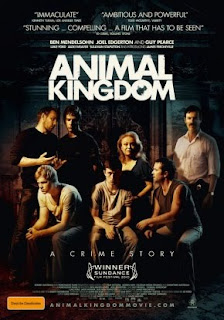Animal Kingdom
 When a film uses criminals as its protagonists, something else is usually at work. The Godfather, Bonnie and Clyde, Scarface, or the Warner Brothers gangster pictures of the 1930s and 1940s almost always were using the criminal underworld as some sort of commentary on society at large. It's a difficult to trick to pull off, because though we may view such characters with vicarious excitement, most of us ultimately are disgusted with antisocial behavior, so there has to be more at work.
When a film uses criminals as its protagonists, something else is usually at work. The Godfather, Bonnie and Clyde, Scarface, or the Warner Brothers gangster pictures of the 1930s and 1940s almost always were using the criminal underworld as some sort of commentary on society at large. It's a difficult to trick to pull off, because though we may view such characters with vicarious excitement, most of us ultimately are disgusted with antisocial behavior, so there has to be more at work.Animal Kingdom, a film by David Michôd, falls short of that. The story of a family of crooks in modern-day Australia, it's a decently made film, with some suspenseful moments and some vivid characterizations. But by the time it was nearing its end I wondered to myself just why I was being presented with this. The family just isn't interesting enough to make me care, nor is there any kind of over-arching theme, except maybe that if you think your family is horrible, get a load of this one.
The film starts with J watching a game show on TV while seated next to his mother. It soon is revealed that his mother is in the middle of a heroin overdose. As EMTs work on her, J can hardly tear his eyes away from the TV. The mother dies, so, as he is only 17, he turns to his grandmother, who takes him in, though she and J's mother had been estranged for years. He is then reunited with his uncles, who are a band of bank robbers, but are now lying low, under scrutiny from the police, who have no compunction with killing them in cold blood.
We then see the struggle as J is lured into the criminal world, but still tries to keep some semblance of a normal life, mostly through his girlfriend. His uncles are a mixed lot: Barry is the thoughtful one, who has invested in the stock market; Craig is a tightly-wound fellow who is dealing drugs; Darren is the baby who mostly follows his brothers' leads, and then there's the eldest, Andrew, nicknamed "Pope," who is the most murderous. They are welcoming of J, but also see him as a potential ally, as when they enlist him to steal a car for a nefarious purpose.
As far as I could tell, the family depicted here were their own band of thieves--they have no connection to organized crime. Aside from still pictures during the opening credits, we don't see them commit any robberies, it's all implied, mostly from voice-over by J. I don't want to get all Robert McKee, but if you can't lay out exposition any other way but voice-over, you have a problem with your film. It's unclear how successful they were as thieves, or what kind of scale they terrorized the citizenry, but they are all living comfortably in suburban homes.
Ruling over this roost is the mother, called Smurf for some reason (perhaps because of her diminutive size). She is part Ma Barker, part Jocasta (her kisses linger on her son's lips just a bit too long), and is expertly played by Jacki Weaver. There is a moment when she decides that a family member must "go away," and it's chilling. But those moments are few and far between.
The cast is unknown to American audiences, except for Guy Pearce as a dogged police detective (I understand that Weaver is well known to Australians). I must admit that I had trouble with some of the dialogue due to accents--a second view of a DVD with subtitles may clear some things up for me. But I'm not inclined to give it a second look, because I just didn't get that wrapped up in the story. I think this is due to two reasons--the Brown family weren't that remarkable, either as people or as crooks, and J (played by James Frecheville) is such an inarticulate dolt that it was painful to watch. Either Frecheville is a brilliant actor, or he was thumped in the head with a two-by-four before each take.
My grade for Animal Kingdom: C+.


Comments
Post a Comment